OCCUPY CENTRAL - DAY 28: Full coverage of the day’s events
Giant pro-democracy banner removed from Hong Kong's famous Lion Rock
PUBLISHED : Friday, 24 October, 2014, 6:03pm
UPDATED : Saturday, 25 October, 2014, 2:55am
Government services remove the banner on Friday morning. Photo: Robert Ng
A team of firefighters and mountain rescuers has removed a huge pro-democracy banner for safety reasons, a day after it was hung from the highest point of Lion Rock, above Wong Tai Sin.
Hours after the removal yesterday, "Hong Kong Spidie", the group that claimed responsibility for hanging the yellow banner, said Hongkongers would never give up their pursuit of true democracy.
"The government can take away our banner up on the Lion Rock, but we can hang our own banner at home, at school, or put it on T-shirts, bags or even your forehead," the group said.
"Anywhere that we can hang up a banner of 'We want true universal suffrage' is our 'Lion Rock'."
The group's message was declared on the six metre by 28 metre banner that appeared on the jagged face in Lion Rock Country Park at about noon on Thursday. A group of climbers was behind the stunt, to show support for the Occupy Central movement.
The banner attracted many hikers to the hill yesterday morning, but police later cordoned off the area. After 11am, a Government Flying Service helicopter flew eight firefighters and five Civil Aid Service mountain rescue officers to the site.
Deputy chief fire officer Leung Wai-hung of the Fire Services Department, said they took about an hour to retrieve the banner.
"We did an assessment and believed this huge banner was a public safety risk because it was quite big," Leung said.
"If a strong wind were to blow it down, you don't know where it might go. If it got onto a road, it would definitely be a danger."
The Agriculture, Fisheries and Conservation Department, meanwhile, is continuing its investigation. A spokeswoman said that displaying any sign, notice, poster, banner or advertisement within a country park without a permit was punishable by a fine of up to HK$2,000 and up to three months' jail.
Lion Rock is a famous landmark that can be easily seen on both sides of Victoria Harbour. Many in the city associate the "Lion Rock Spirit" with striving for a better life - as embodied in 1970s RTHK drama Under the Lion Rock and its title song.
This article appeared in the South China Morning Post print edition as 'Unsafe' banner at Lion Rock removed
Occupy Central not a genuine fight for democracy, says Mahathir Mohamad
PUBLISHED : Saturday, 25 October, 2014, 3:44am
UPDATED : Saturday, 25 October, 2014, 3:44am
Former Malaysian prime minister Mahathir Mohamad told an audience of business elites and political figures in Hong Kong yesterday that participants of Occupy Central were not genuinely fighting for democracy.
If there is one external force that anti-Occupy leader Robert Chow Yung and pro-establishment legislator Priscilla Leung Mei-fun would accept in interfering in Hong Kong affairs, it would be former Malaysian prime minister Mahathir Mohamad, who once curbed protests in his country with tear gas.
The retired politician told an audience of business elites and political figures in Hong Kong yesterday that participants of Occupy Central were not genuinely fighting for democracy as they were just a small number of people trying to change the government's policies.
"If you are going to fight for democracy, you must persuade the majority of the people to [participate]," Mahathir said in response to a question from Leung.
"But when you take to the streets and your number is very small in comparison to the population, and you force the majority of the people to accept your views, that is not democracy."
Chow, leader of the Silent Majority of Hong Kong and also a spokesman for the anti-Occupy Alliance for Peace and Democracy, then asked Mahathir how he would have handled the protests and occupation of major streets if they had taken place in Malaysia while he was still a state leader.
"The best way to handle it is to handle it before the occupying," Mahathir said.
"If you have confrontation, killing or beating them is not the solution of course. Over time they will get tired, and other people will be against them because they are undermining the economy, depriving people of their livelihood."
Leaders in Beijing and many pro-establishment figures in Hong Kong have accused "foreign forces", in particular the United States, of instigating the pro-democracy movement that has seen protesters occupying major roads in various locations for almost a month.
Mahathir, known for his critical views on the US and his autocratic rule, was Malaysia's longest-serving prime minister, holding the post for 22 years. Malaysian police suppressed protests with tear gas and violence under his administration. One such occasion was during a large protest triggered by the arrest of former deputy prime minister Anwar Ibrahim in 1998. Anwar, now his opponent, was once regarded as Mahathir's scion.
This article appeared in the South China Morning Post print edition as Occupy not a genuine fight for democracy: Mahathir
Talks should focus on realistic timetable for democratisation
PUBLISHED : Saturday, 25 October, 2014, 4:57am
UPDATED : Saturday, 25 October, 2014, 4:57am
A helicopter believed to be carrying Hong Kong authorities hovers near Kowloon's iconic Lion Rock, a day after outdoor climbers supporting pro-democracy protesters hung a banner that reads 'We want universal suffrage'. Photo: EPA
A temporal road map for democratisation in Hong Kong post-1997 was a fundamental feature of both the Joint Declaration and the Basic Law.
In particular, Article 45 of the Basic Law uses the specific language of "gradual and orderly progress" and "the ultimate aim" for the election of the chief executive. The singular word "ultimate" is crucial. In other words, the whole process of democratisation was always envisaged to take place over 50 years.
By 2017, 20 years would have passed but there will still be 30 years remaining. Surely, this is the best argument today of both the Chinese and the Hong Kong governments for the latest decision by the National People's Congress. So why have neither articulated this critical time factor much more clearly and emphatically to the people of Hong Kong?
This glaring omission plus the continual defeatist attitude of the Hong Kong government, not to mention second-guessing what Beijing wants in dealing with our own Hong Kong police force, are all proof of the sad mismanagement of the recent events, as well as political naiveté. Our chief executive should have been much more forthcoming and not treated the demonstrators as he has done, stipulating preconditions for meetings.
I have a great deal of sympathy for the student demonstrators and Occupy Central protesters, but their demands would have considerably more force and clear justification if we were much nearer to 2046. We must all accept with patience this temporal road map. Furthermore, their tactic of paralysing the territory is not sustainable.
Already, the ordinary citizens whom they aim to protect and champion are grumbling about the civic inconveniences of daily life. Sooner or later, they will prefer a peaceful way of life without the intellectualism of democracy.
Accordingly, I hope any debate between the two sides should put the timetable for democratisation at the centre, because that is the simplest and strongest argument for bridging the differences between the two sides. I was, therefore, very disappointed again to see that the Hong Kong government did not raise this issue at the talks with the students on Tuesday. If nothing else, it would have been critical to hear from the students (and therefore Occupy Central) how they could justify their apparent acceleration of the temporal road map.
This is surely the very canyon of differences that requires narrowing between the two sides.
Sir David Tang, Central
This article appeared in the South China Morning Post print edition as Talks should focus on realistic timetable for democratisation
Hong Kong police 'more tolerant than those in US or Europe', says CY Leung
PUBLISHED : Saturday, 25 October, 2014, 3:44am
UPDATED : Saturday, 25 October, 2014, 2:35pm
Chief Executive Leung Chun-ying has put forward a robust defence of the police's performance during the ongoing Occupy Central protests. Photo: EPA
Chief Executive Leung Chun-ying has put forward a robust defence of the police's performance during the ongoing Occupy Central protests, saying they had shown "patience and tolerance" not always found in Western democratic countries.
His remarks in a television interview earlier this week chimed with critics of the Occupy movement, who regularly remind protesters they could face rougher treatment at the hands of authorities in the United States or Europe.
Examples of such treatment are seemingly in abundance - from the militarised police on the streets of Ferguson, Missouri, last month after the shooting of black teenager to the death of Ian Tomlinson, a newspaper vendor who was struck and killed by a police officer in London while he was walking home during the 2009 G20 protests.
On Saturday, riot police and tear gas were deployed on the streets of Keene, a sleepy town in the US state of New Hampshire, after drunken college students descended on a nearby pumpkin festival. Dozens were injured when a mob overturned cars and threw projectiles.
Hong Kong's student demonstrators, on the other hand, have remained almost entirely peaceful throughout the course of their occupation. The images of Hong Kong police launching tear gas onto the streets of Admiralty on the evening of September 28 shocked many primarily because of the inoffensive nature of the student protesters.
That shock probably intensified after October 15 when TVB aired a video showing a group of plainclothes police dragging protester Ken Tsang away from the main crowds in Admiralty before kicking and hitting him.
Although that incident was beamed around the world painting an image of Hong Kong police for some, Law Yuk-kai, director of Human Rights Monitor, said the use of tear gas was "an unprecedented deviation of normal police practices".
The last time tear gas was used in Hong Kong was against a group of militant South Korean farmers who flew into the city to protest at the World Trade Organisation meetings in 2005. Some 34 canisters of tear gas were used during the WTO protests compared with 87 fired at the student protesters last month.
"I experienced the use of tear gas during the WTO protests in 2005 and the behaviour of the police was very different," Amnesty International Hong Kong director Mabel Au said.
"Then, the police fired into the sky, but this time they fired into the ground. It's very dangerous as it can land on protesters' bodies."
Au added that the behaviour of the Hong Kong police was unpredictable, saying it was not clear why police were choosing to use certain weapons.
However, a group of peers from Britain's House of Lords last week defended Hong Kong's policing methods, describing them as "largely proportionate".
One recent protest that draws the most obvious parallels with the city's Occupy demonstrations was the Sunflower movement in Taiwan in March.
Authorities in Taipei cracked down on the students after they briefly occupied the Executive Yuan - the governing cabinet's office. Dozens of people were arrested as police deployed water cannons and batons. However, the authorities there did not resort to tear gas.
This article appeared in the South China Morning Post print edition as HK police 'more tolerant than those in US or Europe'
Anti-Occupy Central group storms Mong Kok protest site
Protesters attacked, barriers removed as judge keeps injunction on zones
PUBLISHED : Saturday, 25 October, 2014, 3:44am
UPDATED : Saturday, 25 October, 2014, 8:22pm
Police officers in Mong Kok lead away an anti-Occupy protester. Photo: EPA
Chaos continued to reign in Mong Kok yesterday as a group of angry anti-Occupy Central protesters stormed a pro-democracy camp, dismantling barricades and attacking people, among them a prominent pro-democracy activist.
Witnesses said at least 10 men - many wearing face masks to conceal their identity - forcibly removed a section of barricades on Nathan Road near Shantung Street shortly after 3pm.
At least three of the anti-Occupy group were taken away by the police, who later said six people were arrested for common assault in Mong Kok.
The trouble flared as High Court Judge Thomas Au Hing-cheung ordered that three injunction orders covering the Mong Kok and Admiralty protest zones should stay in effect over the weekend until the court decides whether to extend them next week. The court heard submissions from lawyers representing Chiu Luen Public Light Bus Company, Taxi Association, Taxi Drivers and Operators Association and the owner of Citic Tower, who want the injunctions to remain in place. Lawyers for the protesters had no time to present their arguments.
Gladys Li SC, representing protester Fok Wai-pong in the Mong Kok cases, said applicants might seek to clear the obstructions themselves if the order were to extend over the weekend.
"No one wishes to see the outbreak of serious violence in Mong Kok," Li said.
Yesterday's violence - initiated by the anti-Occupy group - came just hours after a video posted on newspaper Apple Daily's website showed three men apparently discussing the removal plan.
The mainly male Chinese group in their 30s began shaking protesters' barriers violently at about 3pm and - according to witnesses - attacked Occupy supporters, raining punches and kicks on a man who tried to throw a bicycle at them.
"I saw at least six rioters punching and kicking protesters," said Avery Ng, the vice-chairman of League of Social Democrats, who was kicked in the stomach. Ng said he saw a journalist being punched in the head as he was taking pictures.
Later in the afternoon, an anti-Occupy protester who tried to remove a barricade there sparked chaos, resulting in the arrest of an Occupy supporter dressed as the comic-book hero Captain America, who has become a fixture at the protests.
Police spokesman Chief Superintendent Steven Hui Wai-tak reiterated that Mong Kok had become increasingly dangerous.
Meanwhile, the atmosphere at the main Admiralty protest site was in stark contrast. A steadily growing crowd of about 1,000 people gathered as the working day finished.
Some took civic classes, others chatted, ate or rested around the semi-permanent encampment of tents as an elderly couple handed out home-made soup while telling the students not to give up.
Additional reporting by Alan Yu and Emily Tsang
This article appeared in the South China Morning Post print edition as Anti-Occupy mob storms Mong Kok site
You're tearing us apart, former Hong Kong leader Tung Chee-hwa tells protesters
Former chief executive rules out intervention by Beijing, but begs students to leave streets, warning damage could be 'beyond imagination'
PUBLISHED : Saturday, 25 October, 2014, 3:44am
UPDATED : Saturday, 25 October, 2014, 8:18am
Tung Chee-hwa, who is familiar with Beijing's thinking, said it would not use military force to break up the protests now occupying three locations in the heart of the city. Photo: Felix Wong
The Occupy Central movement could hurt Hong Kong's economy severely, tear the community apart and undermine the rule of law if the street protests continue, the city's first chief executive after its return to China has warned.
Tung Chee-hwa, now a vice-chairman of the Chinese People's Political Consultative Conference, met the media for the first time since the democracy protests broke out 27 days ago.
Tung, who is familiar with Beijing's thinking, said it would not use military force to break up the protests now occupying three locations in the heart of the city, as it retained confidence in the abilities of local police.
He also voiced backing for Leung Chun-ying, saying the embattled chief executive had done nothing wrong.
But the 77-year-old, adopting the tone of a worried grandfather, urged the protesters, mostly students, to leave the streets. The city should implement democracy gradually, he said.
"In civilised societies, conflicts are resolved through dialogue, not in the streets," he said. "Students should not use the occupation as a bargaining chip with the government."
The administration's commitment to universal suffrage was genuine, he said, but the idea of allowing the public to nominate chief executive candidates - a key demand of the protesters - went against the Basic Law.
The former shipping tycoon warned that the protests' negative impact would be "beyond imagination" and that the public would bear the consequences.
Hotel bookings and total credit-card spending had dropped 20 to 30 per cent since the protests started on September 28, Tung said. "The fall is staggering. Even more worrying is that it was not a gradual drop but a sudden plunge," he said.
Hotels Association chairman Victor Chan Kok-wai said bookings for next month were only half of those recorded a year ago.
But data from the Travel Industry Council seemed to paint a different picture. Between October 1 and 22, the number of mainland tour groups visiting the city rose 90 per cent year-on-year.
The heads of several luxury brands, including Fendi, Burberry and Longchamp, have all dismissed the suggestion that the protests could damage Hong Kong's position as the region's primary retail destination.
Tung said: "The rule of law is the cornerstone of Hong Kong's success. We can't violate the rule of law while pursing democracy."
Law Society president Stephen Hung Wan-shun said it was "definitely worrying" if the protesters continued to defy court orders to end their blockades.
Tung spoke ahead of a vote by protesters planned for tomorrow and Monday on what details the government should include in a report to Beijing detailing public attitudes on the 2017 election.
The topics up for vote are whether the report should insist that the National People's Congress Standing Committee retract its restrictive electoral framework and whether the dialogue platform should guarantee public nomination in 2017.
The vote will take place at three protest sites - Admiralty, Mong Kok and Causeway Bay - between 7am and 11pm.
Meanwhile, tensions between protesters and their opponents continue, with scuffles becoming a daily occurrence in Mong Kok.
This article appeared in the South China Morning Post print edition as You're tearing us apart, Tung tells protesters
Police claim Occupy protesters wearing costumes are hiding from the law
PUBLISHED : Saturday, 25 October, 2014, 8:18pm
UPDATED : Sunday, 26 October, 2014, 4:45am
Police officers arrest Occupy protester Andy Yung Wai-yib - better known as Captain America - in Mong Kok on Friday. Photo: EPA
Protesters who dress up in costumes to join the Occupy demonstrations could be doing so to hide their identities while breaking the law, police have suggested.
Chief Superintendent Steve Hui Chun-tak made the remark at yesterday's daily press conference. "Some were dressed in different costumes, concealing their own identities as if they were going to a carnival. However, the fact remains that this is an unlawful assembly which has affected many people."
His comments came 24 hours after a man dressed as fictional character Captain America was arrested during a disturbance in Mong Kok. Highlighting the physical confrontations that have become routine at the Mong Kok Occupy site, Hui criticised "selfish" participants acting contrary to the principles of civil disobedience by not showing "a willingness to accept the legal consequences of their actions".
However, for Andy Yung Wai-yib - the man behind the Captain America costume, who has been released on bail - dressing up is a way to protect himself and to provide a comic buffer between protesters and troublemakers. It was his way of bringing creativity and peace to the civil-disobedience movement, he said.
Yung, a lifeguard, was arrested on Friday. An anti-Occupy protester who was trying to clear some of the barricades fell down as Yung tried to keep him away, he said.
He returned to the protest site on Friday afternoon wearing his normal clothes, because his costume had been confiscated by the police.
"I usually come by in my costume in the afternoon and evening when incidents are known to flare up. It helps in defusing some of the arguments, which could turn violent," said Yung, 30.
The chief superintendent, however, said costume wearers created more chaos than peace.
Yung said: "I'll be more low-key now, and will just sit with the rest of the Occupiers." He won't be buying a replacement outfit any time soon, he said, but he will continue to support the movement.
This article appeared in the South China Morning Post print edition as Police criticise costume antics at Occupy after arrest of Captain America
http://www.scmp.com/topics/occupy-central
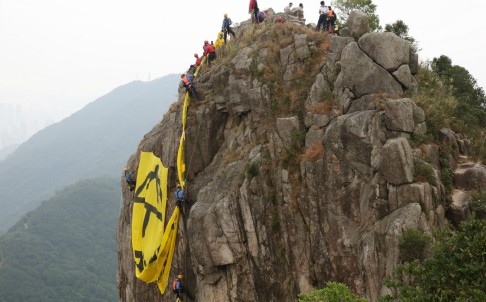
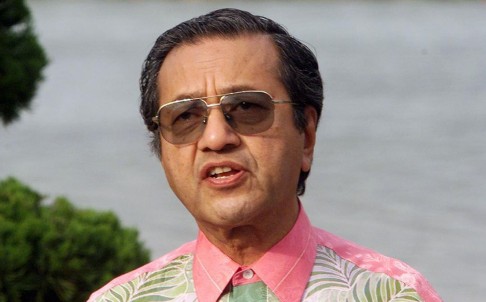
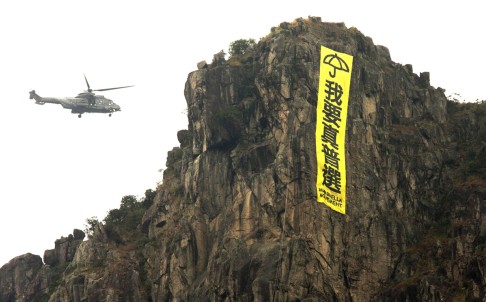
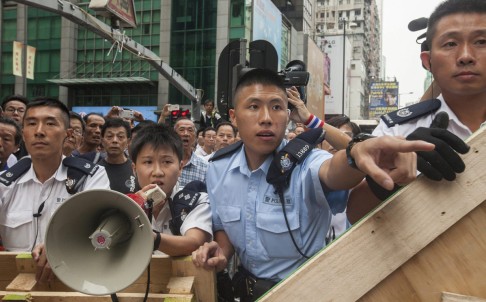
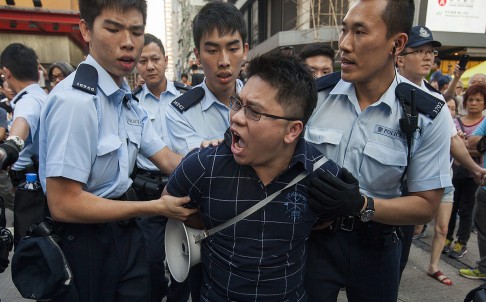
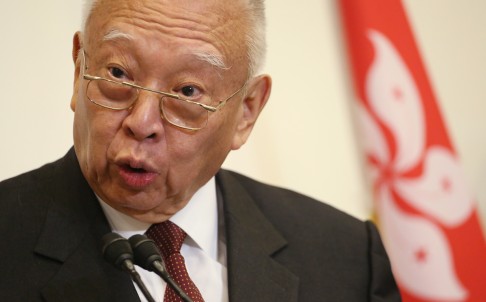
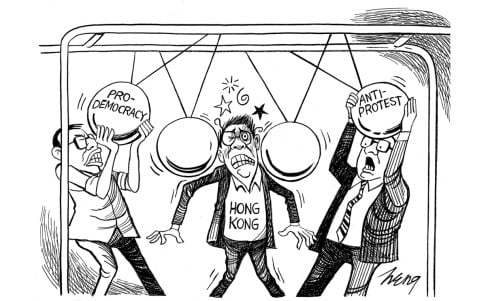
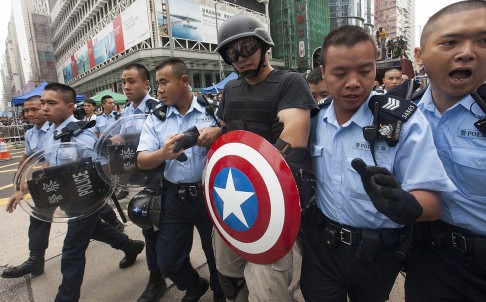
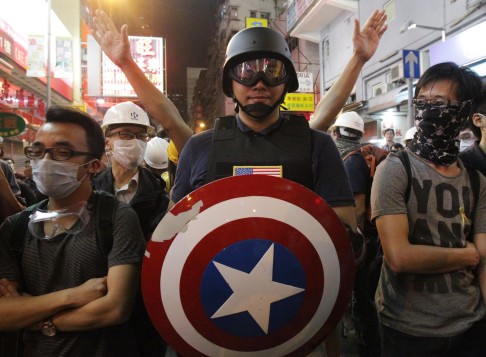
沒有留言:
張貼留言